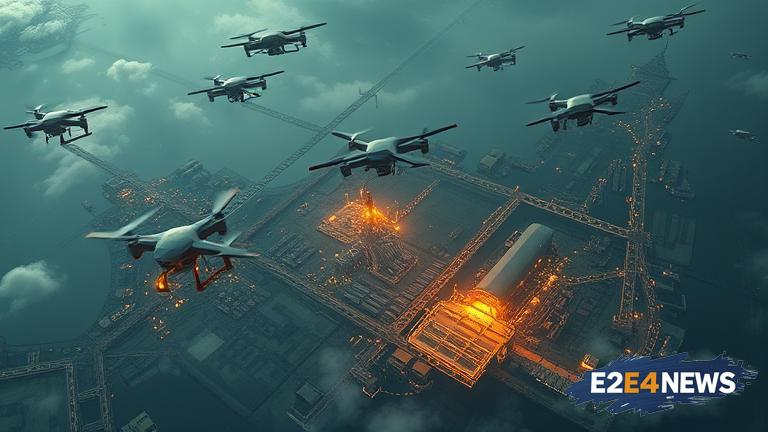The recent drone attacks on a key logistics hub in Ukraine’s Kharkiv region have underscored the importance of this strategic location in the ongoing conflict between Russia and Ukraine. The hub, which serves as a critical transportation node, has been targeted by dozens of drones in a bid to disrupt Ukraine’s supply chains and weaken its ability to respond to the Russian invasion. The attacks have resulted in significant damage to the hub’s infrastructure, including warehouses, railway tracks, and other critical facilities. The logistics hub is a vital component of Ukraine’s economy, providing a crucial link between the country’s industrial heartland and its major ports. By targeting this hub, Russia aims to cripple Ukraine’s ability to transport goods and supplies, thereby weakening its economy and undermining its ability to resist the invasion. The use of drones in these attacks has also highlighted the evolving nature of modern warfare, where unmanned aerial vehicles are increasingly being used to carry out precision strikes against critical infrastructure. The drone attacks have also raised concerns about the potential for similar attacks on other critical infrastructure targets, including power plants, water treatment facilities, and major transportation hubs. The international community has condemned the attacks, with many countries expressing concern about the escalating violence and the potential for a wider conflict. The United States, European Union, and other Western countries have imposed sanctions on Russia in response to its actions, while also providing military and economic aid to Ukraine. Despite these efforts, the conflict shows no signs of abating, with both sides dug in and refusing to back down. The humanitarian toll of the conflict continues to mount, with thousands of civilians caught in the crossfire and millions more displaced. The economic costs of the conflict are also being felt, with Ukraine’s economy suffering significant losses and Russia facing international isolation. The conflict has also had a profound impact on the global economy, with trade disruptions and sanctions affecting countries around the world. As the conflict continues to escalate, there are growing concerns about the potential for a wider war, with some analysts warning that the conflict could draw in other countries and lead to a broader regional conflict. The situation on the ground remains fluid, with both sides engaged in a fierce battle for control of key territories and infrastructure. The Ukrainian military has reported significant gains in recent weeks, but the Russian military remains a formidable force, and the outcome of the conflict is far from certain. The international community continues to call for a peaceful resolution to the conflict, but a lasting peace remains elusive. The conflict has also raised questions about the role of international organizations, including the United Nations, in preventing and resolving conflicts. The use of drones in the conflict has also highlighted the need for new international norms and regulations governing the use of unmanned aerial vehicles in warfare. As the conflict continues to unfold, it is clear that the situation in Ukraine will remain a major focus of international attention in the coming weeks and months. The humanitarian, economic, and strategic implications of the conflict will continue to be felt for years to come, and the international community must remain vigilant in its efforts to prevent a wider war and promote a lasting peace. The conflict has also underscored the importance of diplomacy and dialogue in resolving conflicts, and the need for all parties to engage in good-faith negotiations to find a peaceful resolution. The situation in Ukraine is a stark reminder of the devastating consequences of war and the importance of working towards a more peaceful and stable world.





